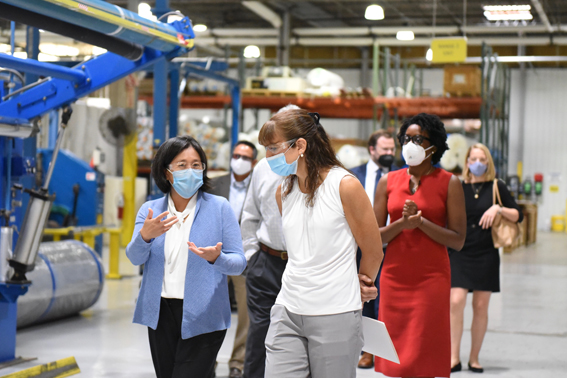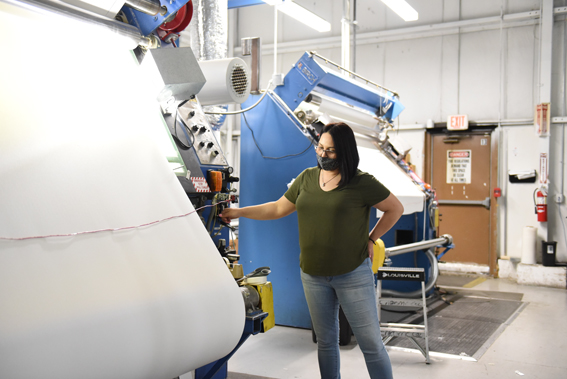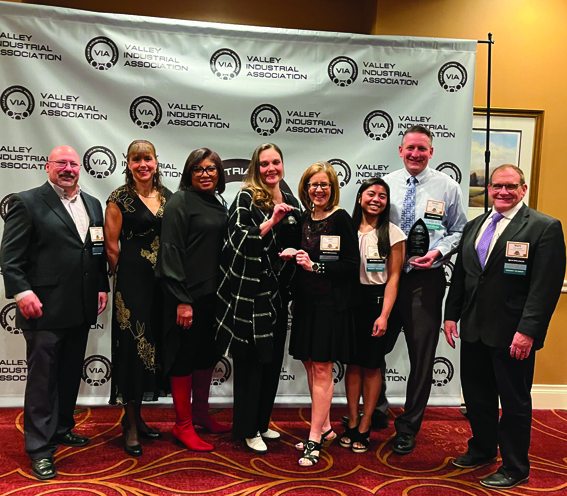As the old adage goes, it can be tough at the top. For the President of Aurora Specialty Textiles, Marcia Ayala, navigating the human coronavirus (covid-19) pandemic and its aftermath has been the toughest challenge, not only of the three years she has been in charge of the company, but of her 16-year career in the textiles industry.
 Aurora Specialty Textiles President Marcia Ayala (centre, wearing white shirt), is pictured during a 2021 plant tour with US Trade Representative Katherine Tai (left) and US Representative Lauren Underwood, right.
Aurora Specialty Textiles President Marcia Ayala (centre, wearing white shirt), is pictured during a 2021 plant tour with US Trade Representative Katherine Tai (left) and US Representative Lauren Underwood, right.Textiles heritage
Aurora Specialty Textiles was founded in 1883 in Aurora, Illinois, USA, and has been owned since 1977 by Meridian Industries, a privately held manufacturing company based in Milwaukee, Wisconsin, USA. In 2015, Aurora moved approximately 25 km south to its current manufacturing facility, in Yorkville, Illinois.
The company's core strength is the application of coatings and finishes to woven, knitted and nonwoven fabrics (typically cotton, polyester (PES), polyamide (PA) and blends), operations that Ayala believes Aurora undertakes better than any other company in the business. It produces digitally printable textiles, speciality home products, tape-backed products and technical textiles. Ayala says: “We have the best canvas in the market, Expressions Canvas, which is all coated fabric. Our quality, our consistency and the service we provide to our customers cannot be beaten."
The move to the Yorkville facility enabled Aurora to install a fully automated, ultra-wide coating and finishing line from EHWHA Glotech, of Ansan-si, South Korea, fitted with a coating head from Matex, of Brendola, Italy. The line can handle materials of up to 3.4 m (134 inches) in width. The ability to impregnate or coat such wide fabrics on a single side makes Aurora special, according to Ayala. She continues: "The range of capabilities that we have, in terms of converting, dyeing, finishing, fabric preparation—all of that enables us to do bleaching, sanding [to create surface textures], angle-inducing(1) and coating. The wide range of textile finishing capabilities we have makes us unique.”
Growing markets
Traditionally, the fastest-growing market for Aurora has been printable textiles. It is also the market that has changed the most, keeping the company light on its feet. “As new print technology becomes available, such as digital printing and new applications for digital, we need to evolve with that, to be innovative and to be constantly looking for new products,” Ayala says. “That whole area of product offerings has evolved the most, and has great potential as we look to get our printed textiles into other markets". Aurora has, for instance, recently started to sell printable textiles for wall graphics.
 Aurora Specialty Textiles Operator, Brenda Salgado, inspects Expressions Canvas. Treated with a proprietary coating developed by Aurora, Expressions Canvas is compatible with latex, solvent/eco-solvent and ultraviolet (UV) digital printers without sacrificing quality or productivity, according to the company.
Aurora Specialty Textiles Operator, Brenda Salgado, inspects Expressions Canvas. Treated with a proprietary coating developed by Aurora, Expressions Canvas is compatible with latex, solvent/eco-solvent and ultraviolet (UV) digital printers without sacrificing quality or productivity, according to the company.Aurora also serves the military market, primarily as a subcontractor, finishing products bound for the armed services. Ayala sees this market as an area primed for continued growth. She notes that Aurora’s strength in the market derives in part from the fact that its products are compliant with The Berry Amendment (which requires the US Department of Defense to give preference in procurement to domestically produced, manufactured or home-grown products).
The market for tapes has been the fastest-growing for Aurora over the past year. This follows a steep drop-off in the business owing to the covid-19 pandemic, which caused demand for products such as gaffer tape and athletic tape fall considerably. Those markets have rebounded well, and now exceed pre-covid levels, Ayala says.
The market for industrial products, such as one Aurora makes for use in power-transmission belts, has also recovered from the pandemic. There is a huge backlog and a growing demand for these products, which are employed in non-automotive applications, such as the farming and forestry industries, heating, ventilation and air conditioning (HVAC), and the gas industry.
Further, Ayala sees significant potential for Aurora's products in the market for personal protective equipment (PPE); the covid-19 pandemic was a learning experience in the USA, which was left vulnerable owing to low stocks of PPE.
Pandemic impacts
The pandemic, and its aftermath, have been learning experiences for Aurora, too. “Our biggest issue has been the supply chain, in terms of continuance, and the rising prices of everything—raw materials, transportation, just everything, non-stop,” Ayala says. “In the past year we have had suppliers of chemicals claim force majeure [a force majeure clause in a contract frees both parties from an obligation if performance is hindered, delayed or prevented because of an event that the parties could not have anticipated or controlled].”
Aurora must purchase all of the fabric it uses. Ayala continues. “We have had significant delays on imported products at the ports. There are two issues there. First, when it is ready to ship, it can be impossible to find a container to put the material in, and second, when it gets here to the USA, being able to physically get into the overcrowded ports. Our materials are just waiting, hanging out at the ports, not being able to get unloaded. That causes delays and significant problems for us and for our customers.“
Domestically, the company has also experienced issues with fabric supply. At times, fabric manufacturers have been unable to obtain the yarn that they need. “It depends on the fabric, but we do have domestic sources for a fair amount of our supplies,” Ayala says. “In some cases, we have both domestic and [overseas] suppliers for a particular product. In the majority of cases, we import only when we cannot get what we need domestically.” Some fabrics that Aurora uses for its wide-width finishing operations, for instance, are not available in the USA in the widths and constructions that the company needs.
New practices
To deal with these problems, Aurora has adopted some new practices. The company has spent considerable time finding alternative sources for its major raw materials. Ayala continues: “The biggest change is our new practice of having second sources for every critical component. The other factor is that the experience has forced us to become very agile. That means reacting very quickly to constant changes, coming up with a plan and making decisions quickly.”
Fabrics are only available for a short time after the company receives a price quote, for instance, meaning that Aurora’s customers have less time to make decisions. “We have to communicate with our customers much more often about pricing,” Ayala says. “Back when prices were not changing much, you did not have to keep having these conversations. You also have to be much more careful and strategic about how you buy your raw materials. These changes are going to linger for quite some time.”
Positioning for growth
Despite these issues, 2022 has been a robust year for business so far and Aurora has positioned itself for growth. There is room for the company to expand at the 11 500-m2 (124 000 square-foot) Yorkville facility, should business conditions warrant.
The layout of the Yorkville building offers greater efficiencies compared with the facility in Aurora, which was a multi-level building dating back to the foundation of the company in the 19th century. Before the move took place in 2015, Aurora adapted an existing building to meet its needs. “We moved so that we could have more space, that is laid out much more efficiently,” Ayala recalls. “Now we are all on one floor. If, for example, we wanted to put in more tenter frames, we have room to grow.”
Aurora currently employs 73 people, a number that has remained steady over the past few years. About half of these have been with the company at least 25 years. The remainder have been with Aurora five years or less. Interestingly, there are not many in between. Ayala describes her staff as a consistent and dedicated workforce. “When we moved, we kept all of our employees,” she says. “We did not lose anybody. Some of our older employees have retired in the last few years, and we have had to replace them. We have more retirements coming up, and we are preparing for that by getting new people trained. Some people who have been with us for a long time and know all the tricks of the trade are going to be retiring, and we want to be sure the knowledge is not lost.”
Research and development
Key to Aurora’s success is its research and development (R&D) department, where all new ideas are funnelled. Many ideas come directly from customers, while others are brought in by the company’s sales force after talking to customers. The R&D team also works directly with customers to develop the products that they need. “We have a stage-gate process that we go through for product development that allows us to sift through proposed projects to see what is a good fit for us,” Ayala says. “We do not want to waste our time or customer time if it is not going to be viable.”
 Aurora Specialty Textiles Product Development Process Engineer, Rikka Abano, working in the R&D laboratory.
Aurora Specialty Textiles Product Development Process Engineer, Rikka Abano, working in the R&D laboratory.Aurora boasts an extensive laboratory, as well as a pilot coater that can run sample fabrics at various lengths, where prototypes can be made—speeding-up product development. “Customers may apply adhesives to [a fabric], or print on it, or they can do some performance testing that we might not be able to do,” Ayala explains. “Then we can tweak the properties of the fabric much faster, and with less expense, than we would by trying to do it on the main production line. We have an engineer whose job it is to take the fabric from the laboratory to the plant and work with the customer to get it produced to the right specifications.”
Sustainable and responsible
Aurora values sustainability, seeking ways to reduce its carbon footprint. New equipment purchased during the move in 2015, such as boilers and lighting, is energy-efficient, according to Ayala. The company treats wastewater in a small in-house facility, and strives to reduce the amount of water it uses. “It is important to the environment and it is important for sustaining our business,” Ayala says. “Energy prices continue to rise, so we want to do what we can to keep our costs down, for us and for our customers. We have an engineer on staff who continuously looks for new ways to increase sustainability.”
In April 2022, Aurora received recognition for its efforts from the Valley Industrial Association, a regional industrial group. The company won the association’s Spark Award for Excellence in Operations for the third consecutive year. Aurora also received a Spark Award for the improvements it has made in sustainability and corporate social responsibility.
 Members of the Aurora team gather after receiving the Spark Award from the Valley Industrial Association in April 2022. From left are: Vice President Operations, John Schuster; President, Marcia Ayala; Director Customer Service, Zaneta McGinnis-McKnight; Quality and Continuous Improvement Manager, Paula Kirby; Director Human Resources, Jeri Farrell; Product Development Process Engineer, Rikka Abano; SH&E Facility Manager, Kevin Shroba; Vice President Sales & Marketing, Mark Shaneyfelt.
Members of the Aurora team gather after receiving the Spark Award from the Valley Industrial Association in April 2022. From left are: Vice President Operations, John Schuster; President, Marcia Ayala; Director Customer Service, Zaneta McGinnis-McKnight; Quality and Continuous Improvement Manager, Paula Kirby; Director Human Resources, Jeri Farrell; Product Development Process Engineer, Rikka Abano; SH&E Facility Manager, Kevin Shroba; Vice President Sales & Marketing, Mark Shaneyfelt.Marketing efforts
Aurora has ramped-up its marketing in recent years, including the building of a greater presence on social network LinkedIn. The effort has proved fruitful, attracting interest from companies wanting to learn more about Aurora and what it does. “We have a plan for how we want to do our social media,” Ayala says. “When we updated our website, which was launched in April 2022, we wanted to make it more clear on our increased capabilities, and show we are able to serve more markets than ever before. We felt that we could do better with our messaging, and it has worked very well.”
Participation in trade shows is another component of the company’s marketing efforts. Aurora is a regualr exhibitor at the IFAI Expo and at Techtextil North America (TTNA), although in 2022, Ayala and staff members attended TTNA, but did not exhibit. Aurora also participates in the ISA International Sign Expo and Print United, formerly known as the SGIA Show. These events have taken on added importance, as the US textiles industry returns to in-person shows as it emerges from the pandemic. Ayala says that TTNA, held in Atlanta, Georgia, in May 2022, signalled a welcome return to something near normal. “This year people were excited to be back meeting in person, and able to have real conversations,” Ayala adds. “It was pretty crowded, but I will not say it was back to normal, because no one knows what that is anymore.”
Ayala is optimistic about Aurora’s future. “We have a great group of people here. I feel very happy with Aurora, and with our operators and with our managers. I feel very confident in our quality, consistency and service. Our capabilities keep growing and our new plant is a world-class operation; it is very clean and very efficient. That makes us stand out.”
